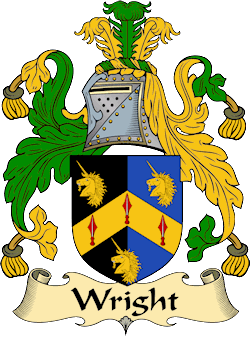Wright

Purchase Heraldry Products
Download Now!

Surname: Wright
Branch: Wright
Origins: Irish
More Info: Ireland
|
|
Background: English, Scottish, and northern Irish: occupational name for a maker of machinery, mostly in wood, of any of a wide range of kinds, from Old English wyrhta, wryhta ‘craftsman’ (a derivative of wyrcan ‘to work or make’). The term is found in various combinations (for example, Cartwright and Wainwright), but when used in isolation it generally referred to a builder of windmills or watermills.Common New England Americanized form of French Le Droit, a nickname for an upright person, a man of probity, from Old French droit ‘right’, in which there has been confusion between the homophones right and wright.
|
 Motto: Motto: Veritas vincit, Truth conquers. Arms: Per pale sa. and az. on a chev. betw. three unicorns` heads couped or, three spearheads gu. Crest: Out of a ducal coronet or, an arm embowed in armour ppr. holding tilting-spear az. pointed or. View the Heraldry Dictionary for help.

Recorded in several spellings including the popular Wright, as well as the much rarer forms of Wrighte, Wraight, Wraighte, Wreight, Wrate, and patronymics Wrightson and Wrixon, this is an early English surname. It is occupational and was used to describe a maker of machinery or objects, mostly in wood. The derivation is from the Olde English pre 7th century word 'wyrhta' meaning a craftsman, itself from the verb 'wyrcan', meaning to work or construct as in wheelwright, cartwright, millwright and wainwright. When 'wyrhta' was used on its own, it often referred to a builder of windmills or watermills. Perhaps not surprisingly this is one of the first occupational surnames to be recorded, and early examples include Robert Wricht of Shropshire in 1274 and Thomas le Wrighte of Derbyshire in 1327. Later examples of the surname recording include Joan Wright and Richard Trevesse who were married on May 29th 1552, at the church of St. Lawrence Jewry, in the city of London, whilst one of the earliest settlers in the New England colonies of America was Jeffery Wright, aged 18 years. He left from the Port of London aboard the ship "Truelove" bound for the Bermuda Island in June 1635. Probably the best known bearers of the name are the Wright brothers, Wilbur (1867 - 1912), and his brother Orville (1871 - 1948), the U.S. aviation pioneers, who designed and flew the first powered aircraft (1903). The first recorded spelling of the family name is shown to be that of Patere le Writh. This was dated 1214, in the tax rolls known as the "Feet of Fines" for the county of Sussex.
Wrights cam be identified with that ethnic group now called "Scotch-Irish," or, more properly "Scots-Irish." Northern Ireland was largely colonized by Lowland Scots in the early 17th century at the urging of the King James I (King James VI of Scotland) who wanted a British presence in Ireland to counterbalance the dominant Irish Catholic population. So, by historical extrapolation, one can infer that our "Wright" roots are in Scotland. Saying more than that about the Wrights is pure speculation. However, for what it's worth, there is a Scottish Clan called the "MacIntyres", who claim the Wrights as a sept of their clan. In fact the Gaelic form of MacIntryre, "an-t-Saoir", is translated "son of the wright or carpenter." It is possible that, as some of these Scottish MacIntyres dispersed into English territory (whether to England, Wales, N. Ireland, or the Colonies), many of them Anglicized their MacIntyre name into Wright. The Scottish "MacLean Clan" also claims a "Wright" sept.
Projecting further back into history, we find that the Scots themselves were originally Irish. Around 500 AD, an Irish group, who called themselves "Scoti," descended on the western shores of modern day Scotland and established the Kingdom of Dalriada. From that base, the Scots eventually subdued, either by warfare and/or intermarriage, the native Picts. By the time of the 17th century the genetic make-up of the Lowland Scot was a biological mixture of many strains, including Pict, Gael, Briton, Roman, Angle, Saxon, Scoti (Scots), and Norse. To a lesser degree we need to throw into the pot a few Norman and Flemish genes. Most of these ethnic groups (except Roman) fall under the banner of the "Celts", an ancient culture that once extended from over most of Central and Northern Europe....even as far east as central Turkey (Galatia). Politically, the Celtic lands were eventually assimilated by the Roman Empire, except for isolated areas, such as Ireland and Scotland.
Name Variations: Wright, Wrighte, Wraight, Wraighte, Wreight, Wrate, Wrightson, Wrixon, Cartwright, Wainwright.
References:One or more of the following publications has been referenced for this article.The General Armory; Sir Bernard Burke - 1842.
A Handbook of Mottoes; C.N. Elvin - 1860.
Irish Families, Their Names, Arms & Origins; Edward MacLysaght - 1957.
The Surnames of Ireland; Edward MacLynsaght - 1957.
The Book of Irish Families Great and Small.
Ancestry.com: http://www.ancestry.com/name-origin?surname=wright
Surname Database: http://www.surnamedb.com/Surname/Wright
WrightStuffHere.com: http://www.wrightstuffhere.com/Wrights/Wrighthistory.html

|
|

The beautiful heraldry artwork for this family is available to purchase on select products from the Celtic Radio Store. We look forward to filling your order!

|
|
|
|
|